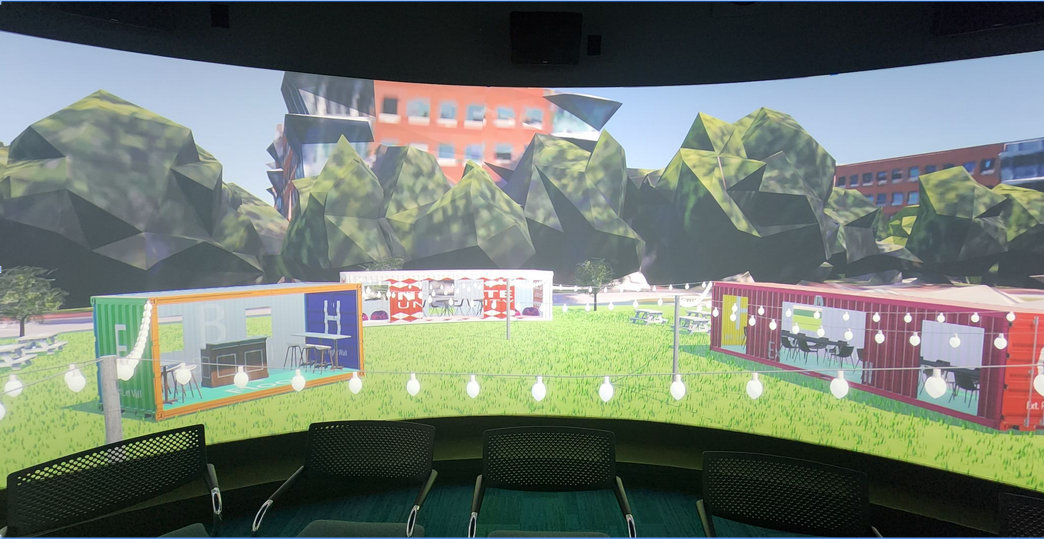
An image of the Centennial Campus Corner on the wall of the Cyma Rubin Visualization Gallery

An image of the Centennial Campus Corner on the wall of the Cyma Rubin Visualization Gallery
It just got a whole lot easier to do immersive visualizations at the Libraries.
If you’ve spent a relaxing moment in the immersive aquarium in the Hill Library's Cyma Rubin Visualization Gallery (formerly the Visualization Studio) or enjoyed a dazzling videorama on its 360-degree screen for Halloween or National Poetry Month, you might have imagined your own work in the space. The Libraries’ newly available Development Kit for Unity Game Engine offers a more accessible way to realize that vision.
The off-the-shelf Unity Game Engine is a common tool in the software and game development industries and is used widely across campus. This development kit augments the Unity engine so that it can be used to design visualizations for the Visualization Gallery or port existing projects to the space’s specific dimensions and capabilities.
The development kit project was led by the Libraries’ two 2022–23 Susan Ellen Everett Interns—Elliott Schultz, a recent graduate in Computer Science Engineering with a Game Development concentration, and Jayden Sansom, a senior with a Game Development concentration and a minor in Art & Design. Jackson Bostian, a recent graduate from the Masters of Art & Design program, also contributed by developing a parallel kit for the Unreal Game Engine.
The Libraries’ Collections & Research Engagement and Learning Spaces & Services departments also participated in the project and will support it on an ongoing basis. Colin Keenan, a University Library Specialist, served as the project manager and mentor for the Everett Interns. Jackson Bostian, a recent graduate from the Masters of Art & Design program, also developed a parallel kit for the Unreal Game Engine.
"VisSDK highlights the enormous talent of NC State university students. Jayden, Elliott, and Jackson far exceeded expectations and their work will benefit future students,” says Hannah Rainey, Associate Head of Research Engagement at the Libraries.
“VisSDK has already been utilized by researchers and content creators on campus to adapt existing VR projects to fit the unique parameters and affordances of the Visualization Gallery. I’m excited by the potential of extending this work to other spaces, such as the Teaching & Visualization Lab at the Hunt Library, and I’m grateful for Colin Keenan's vision and expertise."
The kit offers broad version and tool support for the Unity engine, focusing on standard practices within Unity to avoid obsolescence with near-future versions of Unity. Additionally, the kit allows developers to work from anywhere instead of having to work in the Visualization Gallery itself by incorporating a comprehensive in-editor emulator to simulate the behavior of the Rubin Gallery’s projector array to give a live playback of what a 3D project will look like in the space.
The availability of this development kit has enormous potential for VR-enhanced teaching, learning and research at NC State. And as an openly available resource, users at other libraries and institutions can adapt this project to go beyond individual headsets and provide room-scale VR.